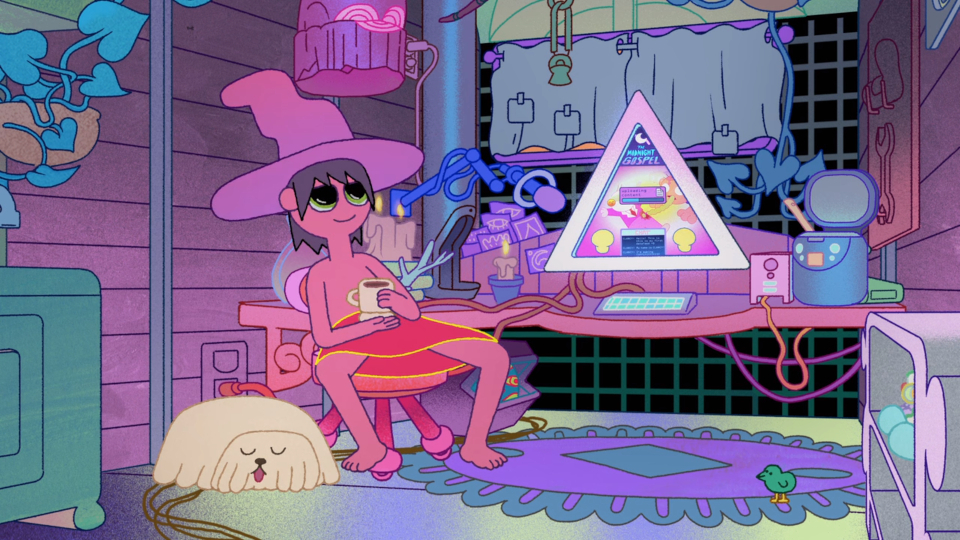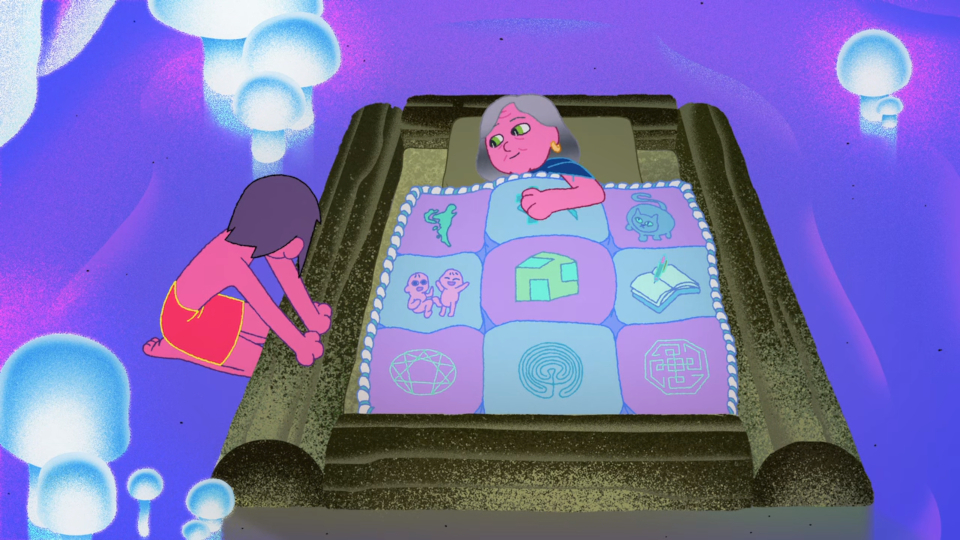To understand Netflix’s The Midnight Gospel, which premiered last week 4/20 as an ode to its spiritual-stoner content, we have to be clear about what it is. It is not comparable to Pendleton Ward’s Adventure Time in a meaningful way besides some thematic elements and aesthetic. Adventure Time, especially by its end, committed to a grand narrative on a cosmic scale.
The Midnight Gospel is a podcast with a visualizer. The majority of the show’s dialogue is cut from interviews done for lead voice actor’s podcast Duncan Trussell Family Hour. Trussell voices Clancy, new owner of a “universe simulator.” Clancy dives into a simulated world every episode to find sims to interview for his “spacecast.”
The setup is unexpectedly chaotic. Trussell’s podcast centers around metaphysical, self-help spirituality topics: mindfulness, active listening, the demonic in Christianity, ceremonial magic and the Golden Dawn, reincarnation. For 20 minutes, the viewer is subjected to dense personal anecdotes as classic Ward fantasy visuals tell an incongruous story. Both audio and video are fascinating but difficult to focus on simultaneously, and I don’t think that is to the show’s detriment.

In fact, it is likely intentional (Spoilers follow). In episode 6, we glimpse Clancy’s motivations: He moved away from his home and sister Sarah after the death of their mother, and he loaned money from Sarah to buy the universe simulator as an escape. Clancy’s forays into the sim function like spiritual porn, desperate attempts to dull the pain of his mother’s death and estrangement from his sister by way of vicarious enlightenment. The hyperstimulus of authentic conversation and fantasy visuals bombards are receptors and encourages a zoned-out stoner state, which is exactly what Clancy is chasing. The simulator itsself resembles a vagina, and Clancy sticks his head into the warm embrace of the womb every time he looks to escape.
So when Clancy’s mother meets him in the simulator hub, apparently piloting a simulated ship of her own, we’re not surprised. “Hello Duncan,” she says. The wall is shattered and the show embraces metaphor. What follows is dialogue lifted from a Trussell interview with his mother Deneen Fendig five days before her death as life cycle symbolism swirls on screen.
It’s real, brutal, and beautiful. The major upside to using authentic conversation is authentic emotion. Duncan truly processes the death of the beloved but perpetuation of love on tape. So, then, does Clancy. When we return to the real world, an obscure subplot in which cops triangulate Clancy’s illegal simulator is coming to a head, while the sim Clancy pops out of is about to explode and “wobble,” which render the immediate area around the simulator extremely dangerous. The solution?
Full Virtualization

Clancy slips his entire body through the vulva and finds himself once more in the womb as the simulator in the real world wobbles. A bus full of his past interview subjects drives along Rainbow Road; Clancy hops on and sits next to sim Ram Dass: “Are we in heaven?” Clancy asks. “Just be here now,” Dass replies.
Clancy has installed for himself a God, one that he can always be sure of, at the expense of the real world. The simulator-servant has fulfilled Clancy’s desire to regress rather than progress. Each episode was an offering of guidance, a practice offered as a way for Clancy to find meaning. Yet the story’s ending encourages a retreat into the virtual, where spiritual guidance is only an interview request away and it doesn’t matter anyway.
“I wasn’t enlightened,” Clancy says in the penultimate episode. “That doesn’t even mean anything.”
Charitable interpretations of the show could say Clancy’s spiritual growth was blocked by his mother’s death, and nothing could be done until he confronted it head on. God, being the simulator, presents him with that opportunity in the final episode, allowing Clancy to act on the collective wisdom he accumulated through the prophets that preceded. When Clancy comes to, he’s presented with the consequences of his failure to ensure his long-term flourishing. The sim’s meltdown is a result of Clancy’s inability to focus on anything besides aimless internet surfing, yet he’s ostensibly rewarded with a dream world.
In tfw no gf, a SXSW documentary, several young men who identify with an isolated internet subculture are profiled. The doc ends on a hopeful note, a “we’re all gonna make it,” after returning to those profiled after a few years. They spurned their full virtualization into irony-bro 4chan personas for personal improvement, striving for something more. Clancy’s end can’t be seen as anything but a failure, in comparison.
